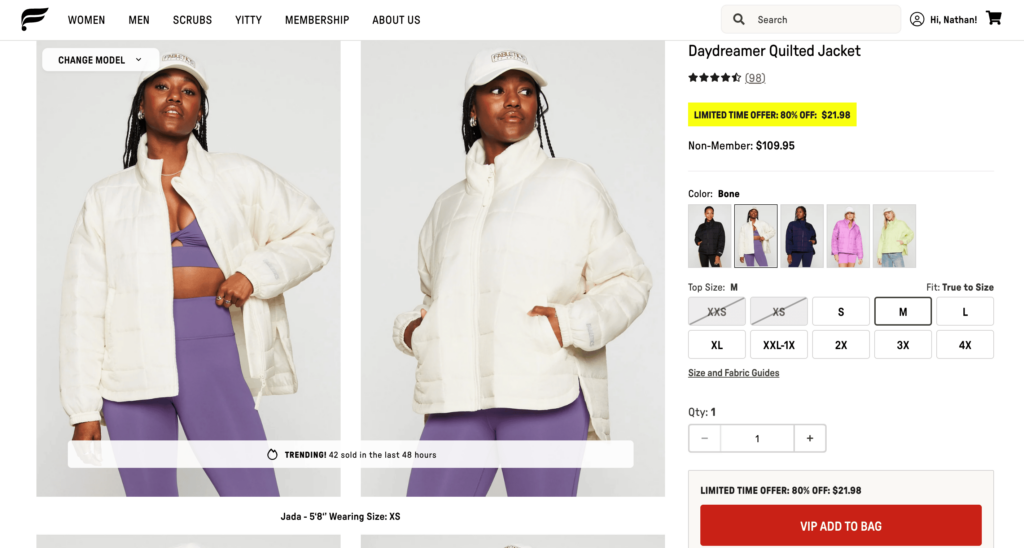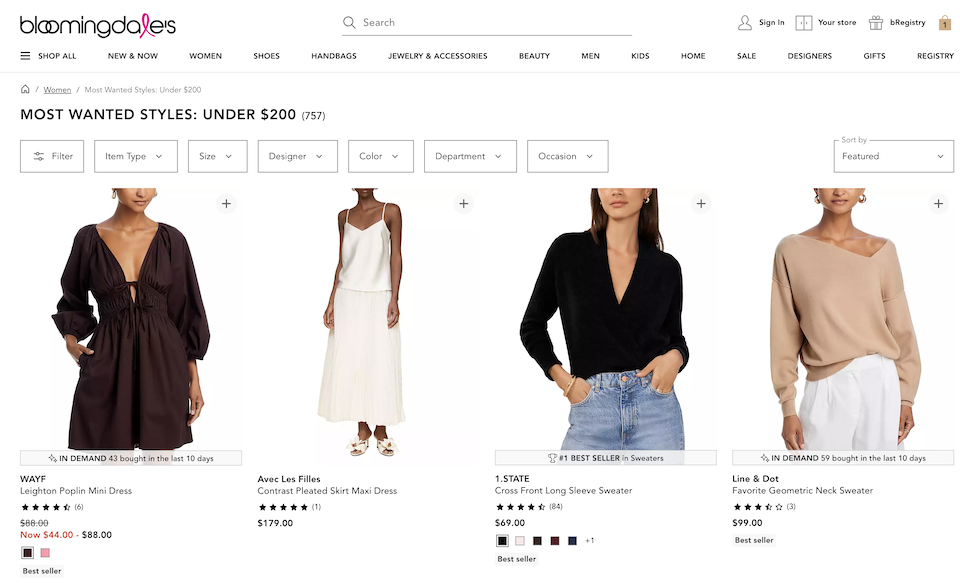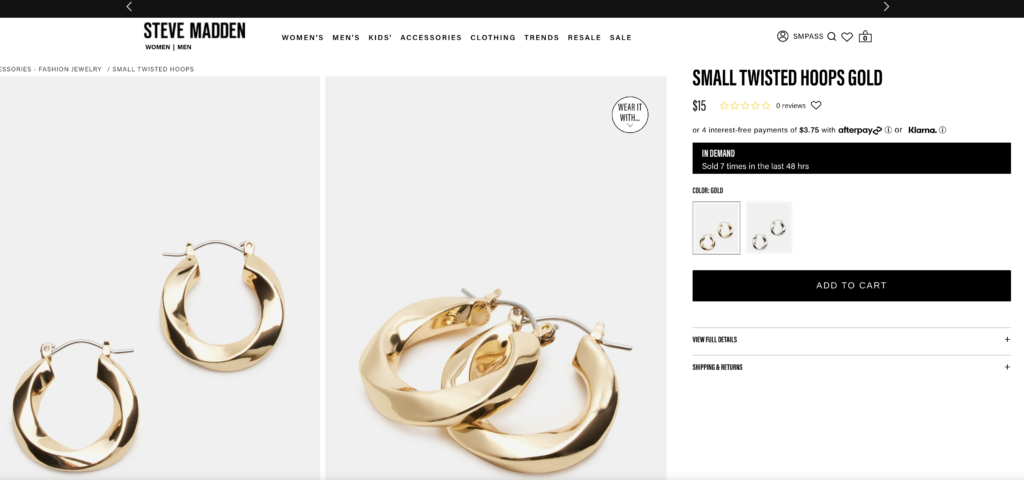What is Social Proof? (Definition and key principles)
Social proof is a powerful psychological principle first defined by Robert Cialdini in 1984 – people look to others to decide how to think, feel, or act. In his book Influence: Science and Practice, Cialdini states:
“In general, when we are unsure of ourselves, when the situation is unclear or ambiguous, when uncertainty reigns, we are most likely to look to and accept the actions of others as correct.” – Dr Robert Cialdini
In digital commerce, this behavior translates directly into purchase intent. Recent research by Gartner shows that 90% of buyers said that some type of social proof – be it recommendations from experts, product reviews, comparison sites, or customer testimonials – influenced their critical research stage. Additionally, in a 2025 research study, 62% of consumers said that FOMO (Fear of Missing Out) directly influences their online buying behavior. The study also indicated that 6 in 10 online shoppers have made purchases due to FOMO messages or influencer posts promoting exclusivity.
This instinct, known as herd behavior, helps consumers make faster, lower-risk decisions. Taggstar brings this behavior online – turning social proof into a scalable driver of trust, urgency, and conversion.
In this guide, we break down how social proof works in real-world business scenarios and how you can use it to influence behavior, build trust, and boost conversions. From psychological context to examples and measurement tips, you’ll find practical guidance throughout.
Here’s what we will cover
- Why is social proof so powerful?
- How is social proof used in business?
- Why is social proof important?
- How do I measure social proof?
- Why does social proof work?
- The worst way to add social proof
- Effective examples of social proof
- Why choose social proof with Taggstar?
- Social proof FAQs
Each section is designed to be actionable – helping marketers, merchandisers, and eCommerce leaders turn behavioral psychology into real business value.
Why is Social Proof so powerful?
Social proof is powerful because it taps into our innate desire to belong and conform to the behaviors of others. This effect is rooted in cognitive biases such as the bandwagon effect, herd mentality, and social validation, which drive people to trust the choices of the majority, especially in situations of uncertainty.
This phenomenon is particularly powerful in uncertain situations where we may lack confidence in our own judgment. Additionally, social proof can manifest in various forms, such as testimonials, reviews, or even the simple act of observing a crowd. The more people we see engaging in a behavior, the more likely we are to follow suit, as it suggests that the majority has made a well-informed decision.
In marketing, this means that social proof builds credibility, trust, and reassurance, making it a key driver behind conversions, brand loyalty, and overall consumer confidence.
How is Social Proof used in business?
In the context of business and marketing, leveraging social proof can help businesses establish authority in their industry, increase conversion rates, and build strong relationships with their target audience. By showcasing positive feedback and experiences from satisfied customers or influential figures within the industry, businesses can create a sense of trust and reliability around their products or services.
In eCommerce, social proof plays a crucial role in building trust and credibility with potential customers by showcasing the behavior and engagement of others.
Types of social proof and how businesses use them
- Customer Reviews & Ratings
Display verified reviews on product pages to build shopper confidence and reduce friction at the point of purchase. - Testimonials & Case Studies
Share detailed stories or quotes from happy customers to build credibility – especially powerful in B2B or high-consideration purchases. - Influencer & Expert Endorsements
Collaborate with industry experts or influencers to validate your products. - Social Media Engagement
Highlight likes, shares, and comments to show active user engagement. - Trending & Popular Products
Showcase products that are currently popular or “best-sellers” to trigger the bandwagon effect. - User-Generated Content (UGC)
Feature photos, videos, or posts from real customers using your products to humanize your brand and create relatability. - Awards & Certifications
Promote industry recognitions to reinforce authority and quality. - Real-Time Purchase Activity
Show live notifications like “12 people bought this in the last hour” to create urgency and encourage conversions.
By integrating these forms of social proof into marketing campaigns, businesses not only influence purchase decisions but also enhance brand trust, customer loyalty, and revenue growth. Combining theory with practical application ensures that social proof in marketing is a measurable, conversion-driving tool rather than just an abstract concept. To explore how social proof works in practice and how it can boost ROI, check out our in-depth blog on social proof in marketing.
Why is Social Proof important?
Social proof is extremely effective in marketing and eCommerce because it relies on the basic, yet powerful, psychological concept that people are more likely to take a certain action if other people are doing it. It is the same factor that motivates us to choose a crowded restaurant over an empty one. And in shopping, when we see other people buying and enjoying a product, we are more likely to think that we will enjoy the product as well.
Here’s why social proof is important:
- Decision making: social proof helps consumers make decisions – especially when dealing with multiple choices or faced with uncertainty. Consumers typically think that if many have chosen a particular option, it is likely a good choice.
- Trust and Confidence: social proof helps establish trust and instils consumer confidence that they are making the right decisions. When consumers see that others have positive experiences with a product, service or organization, they are more likely to trust it and feel more confident in their choice.
- Validation: social proof can also validate a consumer that she has made the right choice. When we see that other people have made the same choice or taken the same action, we are reassured that we are making the right decision, reducing feelings of regret or buyer’s remorse.
- FOMO (Fear of Missing Out): the fear of missing out on something can be a strong motivator for many people. When people see that others are participating in something or buying a particular thing, they do not want to miss out.
Business Benefits of Using Social Proof
By tapping into the “wisdom of the crowd” you will build trust, drive sales, and influence consumer behavior. When leveraging social proof in eCommerce, retailers and brands often see significant benefits including:
- Increases conversion rates – when shoppers see that other people are buying a product or service, they are more likely to invest in the product themselves.
- Elevates customer experiences – when leveraging real-time social proof, it leads to more dynamic and engaging customer experiences.
- Improves product discovery – highlighting social proof messages and content can help shoppers more easily find the product they are looking for.
- Reduces cart abandonment – if a shopper is unsure about completing a purchase, social proof can help reduce uncertainty and cart abandonment. Tapping into the FOMO factor – only 3 left, or 122 others have bought this – can also add a sense of urgency and encourage the shopper to complete the transaction.
How do I measure the impact of Social Proof?
Measuring social proof involves evaluating metrics that indicate how social proof elements (such as customer reviews, testimonials, and social shares) impact user behavior and conversions. Here’s how to measure social proof more effectively:
Conversion Rate Uplift
Track conversions on pages where social proof elements are present versus those without to gauge impact. Look at:
- Overall conversion rates (e.g. purchases, sign-ups)
- Add-to-cart rates
- Checkout completions
Use A/B testing to compare versions of product pages with vs. without elements like reviews, badges, or trending labels.
Click-Through Rate (CTR) on Social Proof Elements:
Measure CTR on social proof elements, such as review stars or “popular item” badges, to assess engagement, such as:
- Clicks on star ratings or testimonial quotes
- Interaction with “X people are viewing this” or “Only 3 left” prompts
- Engagement with influencer mentions or trust badges.
User Engagement and On-site Behavior
Analyze how social proof affects overall page performance:
- Time on page: Are users staying longer where social proof appears?
- Scroll depth: Are they reaching and reading testimonial sections?
- Bounce rate: Does visible proof reduce early exits?
Social Media Metrics
Use social analytics tools to track:
- Shares, likes, and comments on proof-driven content
- Mentions and hashtags related to product or brand reviews
- Growth in followers or traffic from influencer/UGC campaigns
A/B testing is another method to measure the effectiveness of social proof by comparing pages with different social proof elements to identify the best-performing ones.
Tools to track the impact of social proof
Various tools help track and manage social proof:
- Analytics Platforms (e.g., Google Analytics) – Track customer interactions with social proof elements.
- Review Platforms (e.g., Trustpilot, Yotpo) – Gather and manage customer reviews and feedback.
- Social Media Monitoring Tools (e.g., Sprout Social) – Track mentions, shares, and social media sentiment.
- On-Site Engagement Tools (e.g., Taggstar’s own solution) – Display and measure engagement with real-time social proof on product pages to optimize conversion rates.
Why does social proof work?
Social proof works because consumers are more likely to be influenced by the ‘wisdom of the crowd’ and follow the actions of other people. This concept is also known as the bandwagon effect. We trust that we are making the right decision because other people are making the same decision.
When brands and retailers are able to build that trust with consumers, it significantly impacts the bottom line. Research from Edelman found that consumers who trust a brand are more than twice as likely to be the first to buy the brand’s new products and they are more than twice as likely to advocate for a brand they trust. However, on the whole, people trust each other – family and friends, and even influencers – more than they trust brands. According to Edelman, consumers trust their own experiences and the experiences of others more than what the brands say. Which means that however artfully crafted the images and words on the retailer’s website, customers remain sceptical.
By introducing social proof from various sources into your marketing mix and eCommerce site, you build trust, credibility and authority with your customers. Shoppers will feel more inspired, informed and confident that they are making the right purchase decisions, which will in turn boost conversion rates, reduce cart abandonment and return rates, and increase revenue.
The worst way to add Social Proof
While social proof is highly effective, poor execution can have the opposite effect. Here are some of the worst practices to avoid:
- Fake or Unverified Testimonials: Using inauthentic reviews or endorsements can erode customer trust, potentially leading to negative publicity.
- Overwhelming with Excessive Social Proof: Crowding a page with too many social proof elements (such as multiple reviews, badges, and certifications) can create information overload, distracting users and reducing trust.
- Outdated or Irrelevant Proof: Using old or unrelated social proof signals (e.g., awards from years ago or testimonials from irrelevant products) can make a brand appear disconnected.
- Ignoring Placement and Timing: Misplacing social proof, such as showing trust badges at the start of the funnel instead of at checkout, can reduce its effectiveness. Proper timing and placement are key to maximizing social proof’s impact.
What are some effective examples of social proof?
Social proof is one of the most effective ways for retailers and brands to build trust and influence shopper behavior. By showing how others interact with your products, you can help customers feel confident in their choices and move faster towards purchase.
Here are some of the most effective ways to apply social proof – and how leading brands are doing it with Taggstar:
- Customer ratings and reviews: Display star ratings and verified reviews directly on product pages to reassure shoppers of product quality and satisfaction.
- Testimonials and success stories: Share authentic feedback from real customers or case studies to reinforce credibility and performance.
- Showcase popularity: Highlight if a product is popular with other shoppers by displaying social proof messages on product list pages, product detail pages or in the cart. For example, Fabletics used Taggstar’s real-time social proof to highlight product popularity and saw a 3.19% uplift in conversion rates.

- User-generated content (UGC): Encourage customers to share their photos and videos of products in use. Integrating these visuals on PDPs helps customers see products in real life, enhancing authenticity.
- Influencer and expert endorsements: Collaborate with trusted voices in your industry to validate your products and extend reach across new audiences.
- Real-time social proof messaging: Leverage behavioral data such as “Bought by 12 people in the last hour” or “200 people viewing now” to create urgency and confidence. Retailers like Bloomingdale’s implemented Taggstar’s messaging to drive engagement across key product categories and improve customer experience.

- Highlight trending and best-selling products: Debenhams used Taggstar to showcase live trending products and saw a measurable uplift in both conversion and revenue per visitor. Similarly, Steve Madden used social proof messages like “Popular choice” to reinforce shopper confidence and increase sales.

The above are just some of the examples of how companies can leverage social proof. Social proof can be used in many different ways depending on the type of products or services sold and it can also be highly effective across many industries. Most companies will use a mix of tactics and channels to fully tap into the benefits of social proof. B2B and professional services companies typically benefit more from customer testimonials whereas, social proof messaging in particular, has proven to be an extremely effective tool for retailers and brands to create more engaging and dynamic shopping experiences, boost conversion rates and increase sales. For further insights and best practices on social proof, consider exploring our curated videos and webinars.
By showcasing trending and best-selling products on product list and product detail pages with real-time quantifiable data (e.g., Best-seller – bought by 12 people in the last hour), fashion, beauty and luxury companies, for example, are able to significantly increase conversion rates and reduce return rates. In categories with a high volume of categories and SKUs, like retail and home, social proof that highlights the behaviors of other shoppers in quantifiable data (e.g., number 1 product in lighting or 200 people viewing now), improves product discovery and helps shoppers make more informed and confident purchase decisions. Regardless of the application, for retailers and brands, social proof is most effective when it is authentic, trustworthy and real-time.
Why choose Social Proof with Taggstar?
At Taggstar, we take the psychology of social proof and help retailers and brands deliver more dynamic and engaging shopping experiences, build customer trust and increase online conversions and sales.
Powered by AI, Taggstar’s platform offers scalable real-time conversion messaging solutions including social proof messaging.. The Taggstar platform anonymously aggregates shopper behavior and surfaces customisable and relevant social proof messaging, sharing what others are buying in real-time, across the digital shopping journey. With the widest range of customizable messages showing trends, bestsellers in category, product views, inventory availability and more, Taggstar ensures the right message at the right time to optimize the customer experience, boost conversions and drive more sales.
The result? Shoppers see evidence of popularity, scarcity, and trust – right when they’re deciding whether to buy. This bridges the gap between behavioral theory and measurable commercial uplift.
Join the growing list of leading global brands & retailers that trust Taggstar to elevate their shopping experiences and drive significant sales lift. Get started today.
Social Proof FAQs
What is social proof? Social proof is the influence created by seeing others’ actions or endorsements, which builds credibility and can drive purchasing decisions.
What is social proof in marketing? Social proof in marketing refers to using evidence of other people’s behavior – such as reviews, testimonials, or social media engagement—to influence potential customers’ decisions and build trust in your brand.
Why is social proof so powerful? Social proof is powerful because it leverages our natural inclination to mimic the behavior of others, particularly in uncertain situations. It fosters trust and credibility by showcasing that others have enjoyed favorable experiences.
What are examples of social proof? Social proof examples include customer reviews, testimonials, case studies, industry awards, influencer endorsements, and ratings. These elements demonstrate positive experiences with a product or service, influencing potential customers’ decisions.
Why is social proof important? It builds trust, reduces hesitation, and improves conversions by providing customers with reassurance.
How can I add social proof to my site? You can integrate customer reviews, real-time purchase data, and social media mentions to enhance trust and encourage sales.
Which types of social proof work best? The most effective social proof depends on your audience but often includes customer reviews, testimonials, and real-time activity displays.
How can I use social proof to improve my marketing strategy? By integrating reviews, testimonials, influencer endorsements, and real-time social proof messaging, you can increase trust, reduce cart abandonment, and boost sales, turning social proof into a measurable marketing tool.